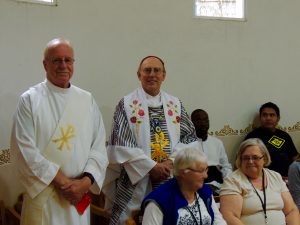HOMILY WEEK 28 03 – Year I
Love, Do Not Judge, and Work for Justice:
(Rm 2:1-11; Ps 62; Lk 11:42-46)
***********************************************
“…tithes of mint and or rue and of every garden herb” (Luke 11:42). So begins the commentary of this Sunday’s readings in The Word Among Us, which will provide the framework for most of this homily.
The message we are given is to keep our priorities of loving, not judging and working for justice paramount, and not let ourselves get distracted by easier, more palatable religious observances.
According to the Law of Moses, Jewish families were expected to give 10 percent of all their produce and possessions as an offering to God. This tithe was used to help support the Levitical priests, who offered sacrificial worship in the Temple, and to help care for the poor of the land. Nobody in Israel should go hungry, and it was up to everyone to make sure that didn’t happen. This was part of God’s command to the Israelites to love their neighbors.
So why was Jesus criticizing these Pharisees so openly and bluntly? They were paying their tithes, weren’t they?
Well, yes and no. Many scholars believe these Pharisees were indeed giving a tenth of their produce, but were choosing to take that from their kitchen seasonings, and not much more. They were doing just enough to look good, but that was all. Just enough to appear to be obeying the Law. Our Israeli guide in the Holy Land told us the main question to this day among the Jews is more “What do I need to do to be a good Jew?” rather than “How can I love my neighbor more fully?” That is a minimalist stance that it seems has endured for thousands of years!
This was Jesus’ constant concern about his opponents: by focusing so much on God’s Law, they lost sight of the people the Law was meant to protect and support. Nobody can live off garden herbs! But that didn’t matter; they just wanted to satisfy the bare minimum.
In an April 2016 address, Pope Francis discussed this very issue. He cautioned us against seeing almsgiving as a “burden or an annoyance from which to free ourselves in haste.” Rather, he said, we should “stop and look in the face, in the eyes of that person who is asking me” (Jubilee Audience, April 9, 2016).

Rev. Hyland, + Sylvain
Someone who did this well was late Deacon Hyland Fraser who shared the preaching task with me on a pilgrimage to Our Lady of Guadalupe in Mexico. On a side-trip to a church by a market one day, we passed by a couple begging on the sidewalk. They were still there later as I browsed in the market, so I stopped, chatted with them in my broken Spanish, gave them some money, and as my camera was hanging down from my neck, asked if I could take their picture, to which they demurely shook their heads.
The next day, in his homily, Francis shared his encounter with that couple. He also returned to them, but remembering these words of Pope Francis, he knelt down, looked them in the eye, took the man’s hands and asked if he could give them a blessing. They understood, nodded and he did so. Then he asked if they could give him a blessing, bowed his head, and received their blessing. His eyes filled with tears as he shared this with our group of pilgrims, while I was convicted. Here was a deacon teaching an archbishop how to relate to the poor! He did this in the spirit of the L’Arche community, who live the teaching that the poor are always being given to. If we want to give something to the poor, give them dignity by allowing them to give something to us, even if it is just a cigarette, and we will be giving them the gift of dignity.
A big and valuable lesson learned – see the people we are helping. Focus on the child of God in front of us. Do this, and we will end up obeying God’s commands more fully than if we were to focus only on the commandments themselves.
According to St. Paul, “The whole law is fulfilled in one statement, namely, ‘You shall love your neighbor as yourself’” (Galatians 5:14). Generosity, kindness, compassion, forgiveness – this is how we fulfill God’s laws.
The readings today summarize all this with three clear mandates: love God by loving others; strive to be just, and do not judge. We could add, let go of any temptation to rely on legalism and externalism.
The Eucharist is an encounter with God’s love, mercy, justice and unconditional love, giving us dignity and profound worth. May our celebration empower us to love from the heart, let go of judging anyone, and strive to be fair and work for justice.



